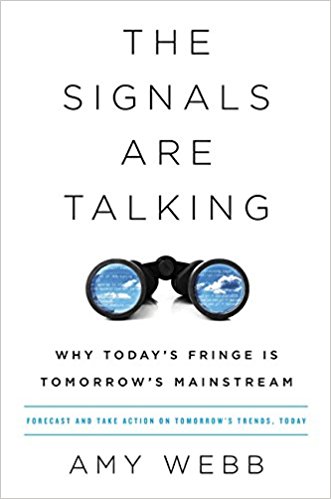You have /5 articles left.
Sign up for a free account or log in.
 The Signals Are Talking by Amy Webb
The Signals Are Talking by Amy Webb
The paper version was published in April of 2016, and the updated audiobook came out in March of 2018.
How might we make the case that universities should devote some of their scarce resources to figuring out the future of higher education?
Does it really make sense to talk about the future of higher ed when our current situation is so challenging?
In this time of declining public funding, challenging demographics, and the continued effects of the cost disease - isn’t any time spent figuring out the future of our institutions a tad bit indulgent?
Those with leadership roles in higher education may want to read The Signals Are Talking before answering these questions.
Webb does two things well in this book. First, she makes a good case for the organizational dangers of ignoring the future. Second, she provides a methodology for discovering the trends that are likely to highly impact our institutions - a methodology that I think can inform how we think about the future of our institutions.
We know the stories well of those once successful organizations that were brought low by failing to understand what the future holds. Webb gives examples of Digital Equipment Corporation (DEC), the once dominant computer maker that failed to anticipate the coming of the PC. Another example that Webb discusses is Blackberry, the mobile company that failed to anticipate that we’d all want to carry around slabs of glass with no physical keyboards.
How much time do folks spend on your campus thinking about the non-obvious but potentially existential threats?
Would your campus culture enable you to organize an institutional pre-mortem? One where a bunch of creative people from across the institution go together, and had to start with the premise that the university has gone under in 2038? The goal of the discussion would be to surface all those things that radically altered the expected path of the institution.
The Signals Are Talking would be a useful book to guide this 2038 pre-mortem campus discussion. Webb puts forward a 6 step forecasting methodology that can be applied to the future of higher education.
This methodology involves: 1) studying the fringe, 2) uncovering hidden patterns of contradictions, inflections, practices, hacks, extremes, and rarities (CIPHER), 3) asking if the patterns are really a trend or just a fad, 4) calculating the timing of the likely impact of the trend (ETA), 5) writing scenarios that lay out different stories around the impact of the trends, and 6) pressure testing the assumptions.
Step 1, studying the fringe, is probably the most important. On most campuses we don’t need to go far to find those who deviate from the norm. One role that centers for teaching and learning (CTLs) can play is to give voice to those at the margins of our institutions. We can seek out those professors who are doing things differently in their courses, and amplify their methods across our campus communities.
Those interested in the future of higher education should actively seek out the contrarians, the troublemakers, and the misfits. The people who are actively working against the status quo. I’m most interested in the fringe of teaching and learning. Those professors, learning designers, librarians, and media educators who are collaborating to create active and experiential learning opportunities for our students.
Webb recommends that anyone interested in figuring out the future needs to be confident enough to question all of their own assumptions. A good higher ed futurist will actively try to disprove their assumptions and beliefs.
I’d love to attend a higher ed pre-mortem conference. One built around disproving what we think we know.
We could invite Amy Webb to give the keynote.
What books on forecasting would you recommend?
What is your favorite book on the future of higher education?
Beyond Bryan Alexander - the higher ed futurist who everybody knows and who knows everybody - who do you follow to figure out the future of higher education?
What are you reading?




